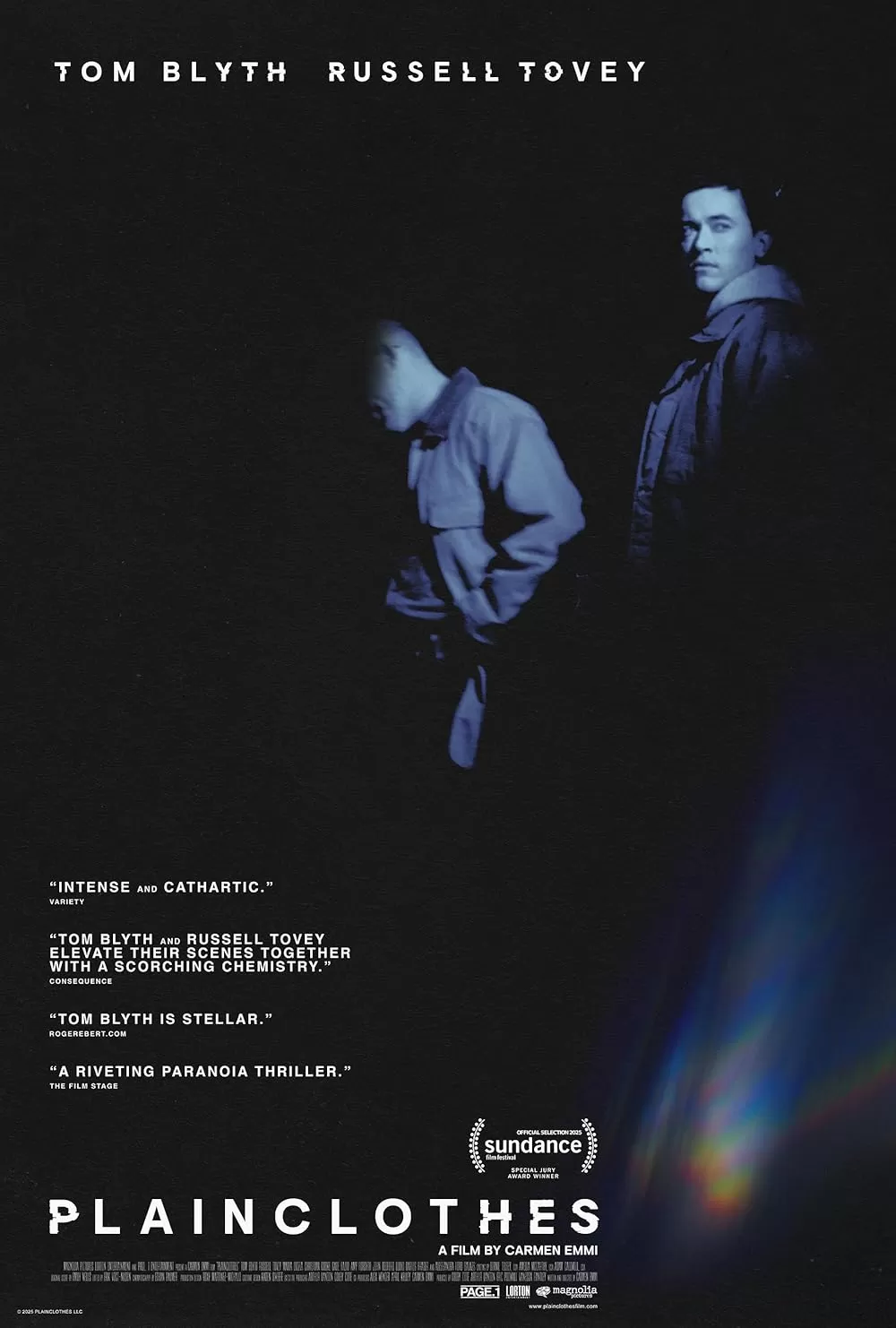There’s something raw and electric about Plainclothes that grabs you by the heart and refuses to let go. Set against the muted, almost dusty backdrop of 1990s Syracuse, the film throws you headfirst into a world where gay identity is shrouded in shadows and hidden behind layers of fear and secrecy. Watching it, I couldn’t help but feel the claustrophobia, the constant tension crackling like static in the air—an invisible enemy lurking in every glance and whispered conversation. The grainy VHS-style narration, a clever touch, doesn’t just tell the story; it makes you feel the anxiety pulsing through our protagonist’s veins, as if you were right there in his shoes, heart hammering with every uncertain step.
At the center is Lucas, a young cop whose life is a delicate dance on a razor’s edge. He’s hiding more than just his badge—he’s concealing a part of himself he’s terrified to reveal. Assigned to patrol a mall bathroom notorious as a secret meeting spot for closeted gay men, Lucas’ job is as brutal as it is ironic: to trap those just like him, the very souls he desperately wants to protect yet must betray. It’s heartbreaking, really—watching a person so caught in their own web of denial and survival. His youthful charm makes him the perfect lure, but behind that charming facade lurks a storm of conflict and confusion. On the home front, there’s a loving, if somewhat oblivious, mother, a frail father whose shadow looms large, and an Uncle Paul who fills the gaps they leave behind. The flicker of hope comes in the form of his ex-girlfriend, the only one who knows his secret, the one he trusted enough to confess that maybe, just maybe, he’s attracted to men.
But life has a funny way of complicating even the best-laid plans. Lucas finds himself falling for Andrew, one of the very men he’s meant to ensnare. Andrew—deeper in the closet than even Lucas—carries his own burdens, his own silent battles. Theirs is a complicated dance of yearning and restraint, charged with the sort of electricity that crackles in forbidden places and stolen moments. They meet in quiet refuges—the darkened movie theater, the whispering trails of a hike—spaces that feel like secret worlds apart from judgment and fear. Yet Andrew’s ironclad rule, to never sleep with anyone more than once, is a painful reminder of the walls they both keep firmly in place. Their chemistry is undeniable, but so is the risk, the looming dread of exposure and ruin. I found myself holding my breath, wondering: how long before their fragile bubble bursts?
What hits hardest is watching Lucas wrestle with his conscience. His initial fear about Andrew’s fate—what if the law catches him?—stirs something within. It’s the first flicker of rebellion, spark of humanity breaking through the cold steel of his uniformed duty. The decision to quit that grim job felt like a small victory, a rebellion against the oppressive systems that keep people like him trapped in silence and shame. The film’s storytelling weaves through flashbacks and present moments, layering the narrative like peeling away the skin of an onion, revealing raw, aching truths beneath. I remember feeling utterly shattered near the end when Andrew’s secret came to light—just when you think you understand the pain’s depth, it cuts a little deeper.

And then, that gut-wrenching moment when Lucas finally finds the courage to bare his soul to his mother—the one heart he desperately wants to reach. The scene is electric, charged with trembling vulnerability. It’s the kind of moment that makes you realize how much ordinary love can be both a sanctuary and a battlefield.
The film’s style—the flickering, lo-fi VHS footage—works like a window into Lucas’ mind, reflecting his paranoia, his flickering hope, and the crushing weight of dread that shadows every interaction. At times, I admit, the timeline felt a bit tangled, a puzzle I had to piece together, but maybe that’s the point. Life isn’t neat or linear, especially when you’re living in the shadows. The editing paints a vivid picture of tension and release, pulling you closer until you’re almost gasping beside Lucas.
And the performances? Absolutely stunning. The actor playing Lucas conveys a deliciously complicated mix of restless confusion and desperate yearning. At work, he’s a coiled spring of tension; with his family, he’s a storm barely contained. It feels so real, you almost want to reach out and comfort him—or shake him, remind him that he deserves more than hiding. Andrew’s portrayal is no less heartfelt. In one poignant scene towards the finale, his quiet words about pain easing over time linger long after the credits roll. I couldn’t help but think of the countless others from that era, silently battling similar storms. It made me appreciate how far society has come—though, of course, the struggle isn’t over.
Despite the heavy themes, Plainclothes isn’t a tale of despair. There’s light threading through the darkness. Moments of kindness, gentle generosity that bloom against the odds. Lucas’ ex-girlfriend stepping up with understanding felt like a breath of fresh air, a reminder that compassion can be found in unexpected places.
So, at its core, Plainclothes is more than just a coming-out story. It’s a piercing look at the cost of living in the margins—the weight of repression and the painful search for identity. It’s sexy, it’s dangerous, and it’s achingly human, a map of a time when desire was tangled with fear and every step forward felt like a leap off a cliff. Watching it, I felt a mix of heartbreak and hope, a reminder that even in the darkest corners, the human spirit fights to shine.

